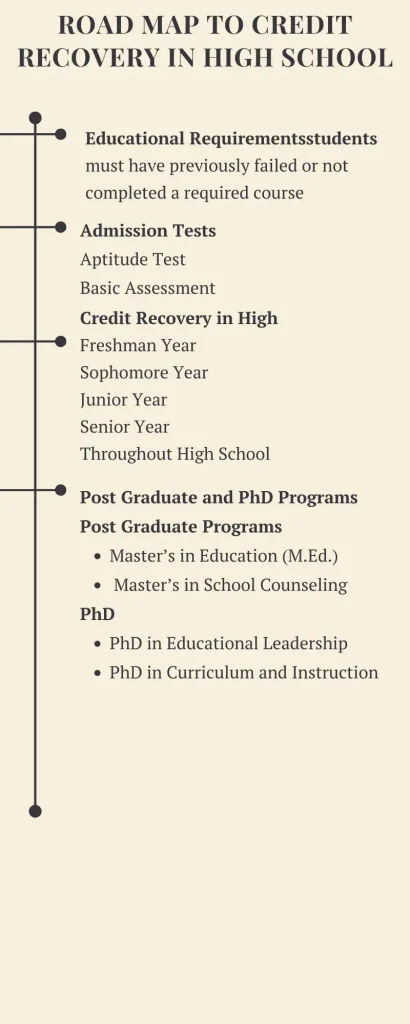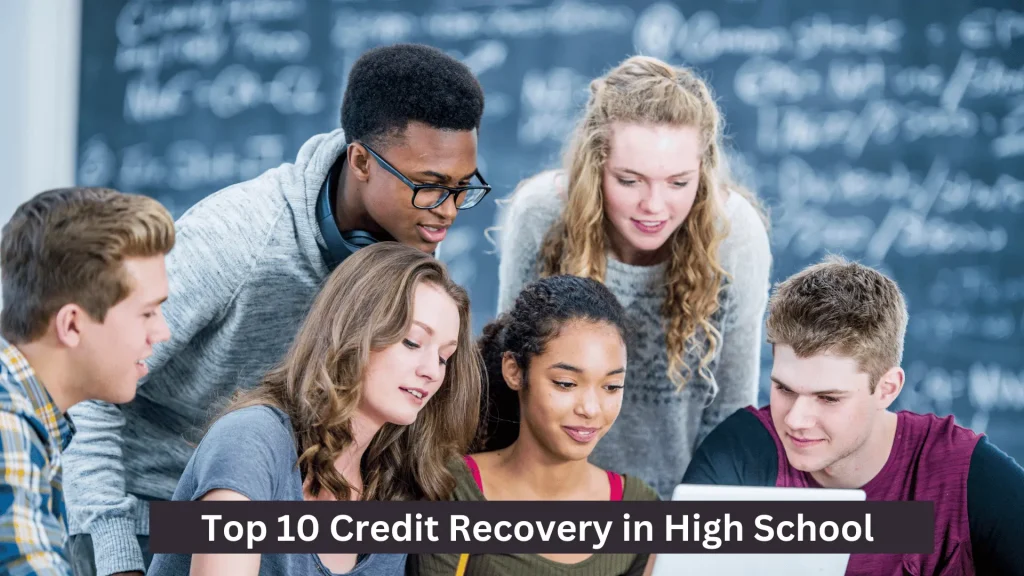How Long Is Credit Recovery in High School
How Long Is Credit Recovery in High School? The duration of credit recovery in high school varies based on the program and student’s needs. Typically, it ranges from a few weeks to a full semester. Schools offer flexible options to ensure students can catch up efficiently. So, how long is credit recovery in high school? It depends on individual circumstances.
What is Credit Recovery in High School
Credit recovery in high school allows students to retake courses they previously failed to earn the necessary credits for graduation. This program is essential for students who must catch up without delaying their graduation timeline. Credit recovery can be conducted through online classes, summer school, or after-school programs.

The goal of credit recovery in high school is to provide students with a second chance to master the material and improve their academic records. These programs are designed to be flexible, accommodating the diverse needs of students while helping them stay on track for graduation. This approach ensures that students have the opportunity to succeed despite previous academic challenges.
How Long Is Credit Recovery in High School
Freshman Year:
Introduction and Awareness:
- Counselor Meetings: Students meet with school counselors to understand the importance of maintaining good academic standing.
- Early Identification: Teachers and counselors monitor students’ progress and identify those struggling academically.
Sophomore Year:
Identification and Initial Intervention:
- Academic Review: Schools review students’ freshman-year performance to identify those needing credit recovery.
- Enrollment: Students may enroll in summer school or online courses to recover credits from freshman year.
Junior Year:
Continued Support and Recovery:
- Ongoing Monitoring: Continued academic monitoring and support from counselors and teachers.
- Flexible Scheduling: Schools offer flexible scheduling options for credit recovery, including after-school programs and online courses.
Senior Year:
Final Push for Graduation:
- Intensive Programs: Schools provide intensive credit recovery options to ensure seniors meet graduation requirements.
- Graduation Planning: Counselors work closely with students to ensure they are on track to graduate, offering last-minute credit recovery options if needed.
Throughout High School:
- Summer School Programs: Available each year for students to recover credits during the summer.
- Online Credit Recovery: Many schools offer online courses for students to recover credits at their own pace.
- Alternative Education Programs: Some districts provide alternative schools or programs specifically designed for credit recovery and dropout prevention.
This structured approach ensures that students have multiple opportunities and methods to recover lost credits and stay on track for graduation throughout their high school years

How to Enter Credit Recovery in High School
Educational Requirements
Eligibility: Typically, students must have previously failed or not completed a required course.
Recommendation: School counselor or teacher recommendation may be required.
Commitment: Students must commit to completing the necessary coursework within the given timeframe.
Entry Tests for Credit Recovery in High School
Assessment: Some programs may require an assessment to determine the student’s current level and specific needs.
Placement Tests: These tests help tailor the credit recovery program to the student’s individual learning requirements.
Application Process for Credit Recovery in High School
Consultation: Meet with a school counselor to discuss the need for credit recovery.
Application Form: Complete an application form provided by the school or program.
Documentation: Provide any necessary academic records or transcripts.
Approval: Await approval from the school or program administrator.
Financial Aids for Credit Recovery in High School
School Funding: Some schools offer credit recovery programs at no cost to students, funded by the school district.
Grants: Local or state educational grants may be available to cover the cost of credit recovery programs.
Scholarships: Some programs offer scholarships specifically for students needing credit recovery.
Payment Plans: If there is a fee, schools might provide flexible payment plans to make the program affordable.
Post Graduate and PhD Programs for Credit Recovery in High School
While credit recovery itself is a program designed for high school students, those interested in specializing in education fields related to credit recovery at a postgraduate or doctoral level may consider the following areas:
Post Graduate Programs:
- Master’s in Education (M.Ed.):
Focuses on educational leadership, curriculum development, and teaching strategies that can enhance credit recovery programs.
Often includes specializations in educational technology, instructional design, and student counseling.
- Master’s in School Counseling:
Prepares graduates to support students academically and emotionally, crucial for successful credit recovery.
Emphasizes strategies for academic intervention and support.
PhD Programs:
- PhD in Educational Leadership:
Focuses on developing policies and programs that support credit recovery at the district or state level.
Research on effective methods and technologies in credit recovery.
- PhD in Curriculum and Instruction:
Involves advanced study on designing and implementing effective credit recovery curricula.
Research on innovative instructional methods to aid struggling students.
Top 10 Credit Recovery Programs in High Schools

Florida Virtual School (FLVS):
- Overview: Offers a wide range of online credit recovery courses.
- Features: Flexible scheduling, self-paced learning, and access to certified teachers.
Connections Academy:
- Overview: Provides comprehensive online credit recovery programs.
- Features: Personalized learning plans, real-time teacher support, and interactive curriculum.
K12 Inc.:
- Overview: Known for its extensive virtual learning options for credit recovery.
- Features: Customizable course options, 24/7 access to coursework, and engaging multimedia content.
Edgenuity:
- Overview: An online platform offering various credit recovery courses.
- Features: Interactive video lessons, real-time feedback, and progress tracking tools.
Apex Learning Virtual School:
- Overview: Focuses on providing rigorous and engaging online credit recovery courses.
- Features: Adaptive learning technology, immediate feedback, and teacher support.
Odysseyware:
- Overview: Offers self-paced online credit recovery courses.
- Features: Customizable lessons, interactive activities, and support from certified teachers.
Acellus Academy:
- Overview: Blends video-based instruction with assessments for credit recovery.
- Features: Adaptive learning, real-time progress monitoring, and personalized support.
Graduation Alliance:
- Overview: Specializes in dropout recovery and credit recovery programs.
- Features: Personalized learning plans, comprehensive support services, and flexible course options.
PLATO Learning (Edmentum):
- Overview: Provides mastery-based online credit recovery courses.
- Features: Engaging content, real-time data tracking, and targeted remediation.
Fuel Education:
- Overview: Offers a range of online credit recovery solutions.
- Features: Customizable curriculum, 24/7 access to courses, and support from certified educators.
These programs provide students with the necessary tools and support to recover credits efficiently and stay on track for graduation
Factors Affecting the Length of Credit Recovery in High School
Student’s Academic Needs:
Severity of Credit Deficit: The more credits a student needs to recover, the longer the program will take.
Individual Learning Pace: Students learn at different rates; some may complete courses faster than others.
Program Structure:
Mode of Delivery: Online programs may offer more flexibility and potentially quicker completion than traditional in-person classes.
Course Rigor: The difficulty level and requirements of the credit recovery courses can affect the time needed for completion.
School Policies:
Scheduling Options: Availability of summer school, after-school programs, and weekend classes can impact the duration.
Credit Requirements: Different schools have varying policies on how many credits can be recovered at a time.
Student Commitment and Support:
Engagement Level: Highly motivated students who engage fully with the program may complete it more quickly.
Support Systems: Access to tutoring, counseling, and additional resources can help expedite the credit recovery process.
Final Verdict
Credit recovery in high school provides a crucial opportunity for students to stay on track for graduation by retaking failed courses. With various program options and support systems available, students can efficiently recover credits and achieve their academic goals, ensuring they don’t fall behind in their educational journey.
FAQs
What is credit recovery in high school?
Credit recovery allows students to retake failed or incomplete courses to earn necessary credits for graduation.
How long does credit recovery take?
The duration varies based on the program and the student’s needs, typically ranging from a few weeks to a full semester.
What are the eligibility requirements for credit recovery?
Students must have previously failed or not completed a required course and may need a counselor or teacher recommendation.
Are there any costs associated with credit recovery programs?
Costs can vary; some programs are funded by the school district, while others may require payment, often with available financial aid options.
Can credit recovery be done online?
Yes, many credit recovery programs offer online options, providing flexibility for students to complete courses at their own pace.
